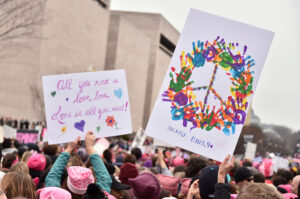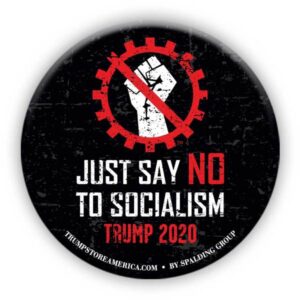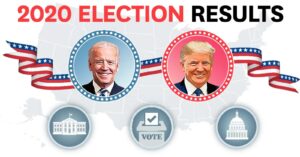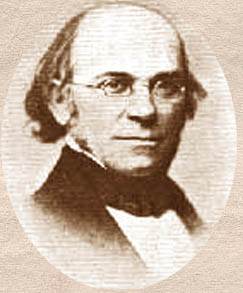
If you’ve read any of my recent social media posts concerning racial injustice, the upcoming election, and police brutality, it might surprise you to learn that I am a registered Republican. Not only that, the work I have done for political campaigns has been exclusively for Republicans. And yet, friends and acquaintances on social media are convinced that I am a liberal Democrat who hates our country.
I thought it might be interesting to track the progress of my political ideology from a young pup who once joined a political campaign as a way to impress a girl, to today, where my concern is much more for the future of our country than the future of my love life.
My first taste of politics wasn’t much of a taste at all. My father was friendly with Jack Hill, a former Congressman who was running for mayor in my hometown. I didn’t know anything about Hill or his politics, but he had been nice to my father, so when Dad asked me to handout leaflets for Hill, I agreed. That was it. One afternoon of handing out leaflets. I guess it was an introduction to politics, but just barely.
I point to the 1980 presidential election as the time I became politically aware. Until then, politics was something that was happening outside my view. I knew it was out there somewhere. I just never saw it. In 1980, there was a lot of buzz about Ronald Reagan, who was taking on the incumbent, Jimmy Carter. But it was neither Reagan nor Carter that I went to work for. It was John Anderson, the Illinois Congressman who ran as a Republican in the presidential primary, and when he lost, became the candidate for the National Unity Party.
Truthfully, I didn’t know much about Anderson or his policies. What I did know was that Debbie Marsh (not her real name) was beautiful and she was active in Anderson’s campaign. I was smitten and thought I could get close to her by joining the campaign as a volunteer. I was wrong. After working a couple of weekends for Anderson, I met Debbie’s older, taller-and-better-looking-than-me boyfriend, and I lost interest in the election. In case you’re not good at history, Anderson didn’t win.
A few years later, a friend recruited me to place yard signs for Tom Corcoran, who was running for Congress from Illinois as a Republican. I was in college at the time and had taken a couple of political science courses. To see the street level version of a political campaign piqued my interest. I went back to college and immediately signed up to work on the Congressional campaign of Kenneth McMillan, a Republican. McMillan ended up losing, but the experience made me want to get more involved in future campaigns.
In college, I started developing a political ideology. In 1980, Jimmy Carter was president, and the nation felt depressed. The economy was doing poorly, we had been humiliated in Iran, and we were suffering through an energy crisis that included rolling brown outs in major cities. It seemed that our best days were behind us.
Then along came Ronald Reagan. Almost immediately, our hostages were returned by Iran, and things started to look up. Reagan had a charisma and a belief in America as “a shining city on a hill” that was contagious. He stood toe-to-toe with Russia during the Cold War, and did it with a confidence I hadn’t noticed in previous presidents. I liked what I saw. And since he was a Republican, I became a Republican.
After college, I went to law school for a year, but wasn’t a very good student, and didn’t like the school I was attending. So, I quit law school and instead went to grad school to get a masters degree in political science. By this time, I had developed a real interest in political systems and campaigns.
A few years later, while living in St. Louis, I worked for Jack Buechner, a Republican, who was running for Congress. I was fortunate to get more involved with Jack’s campaign, participating in fundraising activities, planning campaign events, and distributing signs and leaflets. It was a good experience. Jack won, and at the celebration of his victory on election night, I remember feeling like I had found a home with my Republican colleagues.
At this point in my life, I would have been considered a moderate Republican. Fiscally, I was conservative, but more moderate on social issues. Even then, despite the fact that I believed in small government and balanced budgets, I felt that government should work for the benefit of its citizens, not corporations or special interests.
The 1980s were good years for Republicans. Reagan pulled the country back up from the Carter doldrums and made us feel good about ourselves again. This ability to make people feel good about themselves and their situation is underrated. I understand the importance of a politician’s policies, but as important as they are, policies are often dry and technical. They don’t inspire people to action. They don’t inspire confidence. They don’t inspire pride. Politicians do that. And that was Reagan’s strength.
I admit that I am largely blinded by the politics of the 1980s and early 1990s. I saw the good, but often overlooked the bad. I made excuses for some of the ill-considered policies and excesses of Republicans of that era. I wanted to support winners, so I couldn’t admit that some of the things they were doing were wrong. It’s something that I see so clearly these days with Trump supporters. They can never be critical of the president because it would mean that they were wrong to give him their support. They would rather continue down the wrong path than admit that they made a wrong turn.
In 1993, I became the state legislative coordinator for a large insurance company. It was in this position that my eyes were really opened. My job involved encouraging employees and associates to get involved in the political process, working with lobbyists to push our company’s agenda, and occasionally meeting with legislators and government officials to discuss issues critical to our company.
That job was a great experience, but after doing it for a while, it really soured me on politics. They say that if you love sausage, you should never watch it being made. Same thing with politics. Seeing how things really work, and how important money is to the process, can be really discouraging. I went into the process a wide-eyed noob, and came out a disgruntled, frustrated veteran.
Despite getting burned out, working the legislative job had tremendous value. With everything I saw and experienced, it took me some time to process it all. When I left the job, I avoided politics for several years. I didn’t watch TV news, and rarely read anything about politics in newspapers or magazines. I didn’t really know what was going on politically, and I certainly didn’t have a deep understanding of current events. I’ve never been happier. Some would call it ignorant bliss, but I would point out that ignorant bliss is still bliss.
It was during this period of intentional disconnection that my political ideology began to change. Reflecting on my experience as a legislative coordinator, I began to recognize how much the government tends to work for its own interests, not the citizens. To be sure, like any profession, there are good, altrustic people in politics, and there are bad, self-interested people. And there are a lot that exist in the gray area somewhere in the middle. The thing that they all have in common is that they need money to continue their political careers. Often (but not always), if you are coming to them without money, they are not particularly inclined to listen to you.
This realization really bothered me because I recognized that most people don’t have lobbyists or trade associations to push their issues. They don’t have the disposable income to pay for access. So, even though, theoretically, the government exists to serve and defend them, in practice, most people don’t have the wherewithal or the voice to petition the government.
I also was becoming increasingly disillusioned with the Republican party. My politics were beginning to evolve, but not in the same direction or at the same speed as the Republican Party. I think it was the Tea Party movement that really started pulling Republicans to the right. Not only that, but they influenced Republicans to be uncompromising in their positions. Particularly during the Obama years, Republicans in Congress became the party of obstruction. Republican Sen. Mitch McConnell made it clear that his mission was to obstruct any legislation from passing, with the goal of making Obama a one-term president.
This statement by McConnell made it clear that he viewed his job first as political, and second as legislative. He wasn’t interested in governing. He wanted to thwart the re-election of his “enemy” He had chosen party over country.
For eight years, McConnell and the Republics did everything in their power to prevent legislation from passing. They became more and more intransigent, refusing to work with Obama and the Democrats. There are plenty of reasons to criticize Obama for the things he failed to accomplish during his two-terms in office, but Republicans deserve the lion’s share of the blame for simply refusing to do their jobs, hoping their bad faith efforts would reflect badly on their opponents.
Even now, with the nation suffering through a pandemic, high unemployment, our economy in free fall, and the president actively working to interfere in the upcoming election by, among other things, destroying the post office, McConnell still refuses to consider legislation to address any of these issues. He continues to choose party over country, and his Republican colleagues and supporters love him for it.
My political ideology was already changing before Trump landed on the political scene, but that change significantly accelerated upon his election. Trump is the worst of us. He is narcissistic, greedy, self-interested, dishonest, and untrustworthy. He is unlike any president we have had in my lifetime, and I would argue he is the worst president in history. But he has performed one very important function: He has shown the country how unprepared we are for someone like him. And he has made it clear that we need laws and processes to make sure it never happens again.
Although I’m still a registered Republican, I no longer consider myself part of the Republican Party. In fact, I would argue that the Republican Party doesn’t exist anymore. They are now the Trump Party. They just haven’t made it official by changing their name.
I don’t particularly like labels. I’m no longer a Republican, and I’m not a Democrat. I’m also neither conservative nor liberal. If I have to have a label, I choose “pragmatic.” I like policies and programs that work, that make sense for the whole country. In fact, I think it’s a little strange that people are so quick to label themselves with one political ideology or the other, as if the same political philosophy is the correct answer to every issue. I reject that way of thinking. I have no allegiance to any political party. My only allegiance is to the country and its citizens. The policies I support are those designed to help citizens and make the country stronger. The policies I oppose are those designed to enrich a few at the expense of the many, ultimately weaking the country
There are three issues in particular I am passionate about at the moment. The first is getting Donald Trump out of office. He is the most serious threat our democracy has ever faced. In recent months, he has inched us closer to authoritarianism and fascism. And with each move he has made, he has remained unchecked by Republicans in Congress, emboldening him further. If he is elected for a second term, I don’t think our democracy will survive. Our country is truly at a crossroads.
Second, I am passionate about improving race relations in the United States. The first step is to make changes that guarantee black Americans equal rights and justice under the law. We should not have to protest for blacks to have the Constitutional rights and privileges they are already entitled to. The George Floyd murder in Minneapolis was a horrible thing, but I think it opened a window for us to really address the issue of race in America. It’s well past time we made changes.
Third—and related to number two—is the issue of police brutality, especially against black males. This is a difficult issue to address, because the police, as a group, don’t believe they have a problem. It is also difficult because I, like a lot of people, know cops who are good, decent, hard-working, caring folks who want to do a good job for their communities. It’s hard to be critical of people you like and admire. Even so, as if it wasn’t obvious before, the death of George Floyd and the protests against police brutality that have been met with more brutality by law enforcement underscores how crucial this issue is.
There are two other issues that I’m passionae about, but haven’t talked about much yet. That is, universal healthcare and income inequality. There are good, conservative arguments to support both issues. I won’t bore you with those reasons now, but I expect to be talking about both much more in the future.
I have been very vocal on social media about these first three issues, but let me pull back the curtain a little bit to let you in on a little secret. I don’t like writing about politics. I don’t like writing about anything controversial. I used to not bring up political issues on social media at all. But the stakes are too high to remain quiet.
Remember how I said earlier that I was much happier when I didn’t follow the news or stay up on current events? Well, that is still the case. I know I would be much happier if I just sat out this election and didn’t comment on these issues. Truth is, because of my station in life, I have the privilege to ignore the election and remain silent on the issues facing us as a country. I’m a straight white male with a decent income and a safety net should things go wrong. Whatever Trump does to our country, I will probably be okay, or at least won’t be as affected as some. If race relations or police brutality aren’t resolved, its probably not going to impact me. But that wouldn’t be very responsible of me, would it? I have a voice and a platform (as small as it is), so I feel an obligation to speak up.
To quote the Bible, “To whom much is given, much is required” (Luke 12:48). I have been blessed in life. That’s why I feel an obligation to try to make our country and our world a better place, and to advocate for “the least among us,” the sick, the poor, the downtrodden, and anyone else who needs a voice.
Put another way, as Edmund Burke said, “The only thing necessary for evil to triumph is for good men to do nothing.” I want to be a good man, so I’m obliged to be involved, raise my voice, and take action.

 After a day like yesterday, how do we, as a nation, move forward?
After a day like yesterday, how do we, as a nation, move forward?

 Leading up to the 2020 Presidential Election, I wrote a Facebook post explaining socialism. I was frustrated that so many people labeled almost every proposal they opposed as socialist. It had gotten so bad that TV news interviewers were beginning to question Democratic politicians as if they were socialists.
Leading up to the 2020 Presidential Election, I wrote a Facebook post explaining socialism. I was frustrated that so many people labeled almost every proposal they opposed as socialist. It had gotten so bad that TV news interviewers were beginning to question Democratic politicians as if they were socialists. A few times in my life, I have converted to a keto diet. If you’re not familiar, a keto diet requires the dieter to eat little or no carbohydrates. This high protein, high fat, low/no carb diet goes by a few different names, but they are all essentially the same.
A few times in my life, I have converted to a keto diet. If you’re not familiar, a keto diet requires the dieter to eat little or no carbohydrates. This high protein, high fat, low/no carb diet goes by a few different names, but they are all essentially the same. I have heard that it is a fool’s errand to try to understand Trump voters. Some say that they defy understanding. Others say there’s nothing to understand, that they are just deplorable human beings filled with hate and rage. I can’t accept either of these points of view. I know too many people who support Trump who are decent, well-intentioned human beings, both friends and family members.
I have heard that it is a fool’s errand to try to understand Trump voters. Some say that they defy understanding. Others say there’s nothing to understand, that they are just deplorable human beings filled with hate and rage. I can’t accept either of these points of view. I know too many people who support Trump who are decent, well-intentioned human beings, both friends and family members. The song we know as “America the Beautiful” began life as a poem, originally entitled “Pikes Peak.” It was written in 1893 by Katherine Lee Bates, a college professor at Wellesley College. When Bates’ poem was first published in 1895 in a special 4th of July periodical, the name was changed to “America.”
The song we know as “America the Beautiful” began life as a poem, originally entitled “Pikes Peak.” It was written in 1893 by Katherine Lee Bates, a college professor at Wellesley College. When Bates’ poem was first published in 1895 in a special 4th of July periodical, the name was changed to “America.”

 During times of civil unrest, particularly when that unrest is motivated by unequal justice based on race, people tend to quote Dr. Martin Luther King Jr. One of Dr. King’s most popular quotes at times like this is:
During times of civil unrest, particularly when that unrest is motivated by unequal justice based on race, people tend to quote Dr. Martin Luther King Jr. One of Dr. King’s most popular quotes at times like this is: In my
In my  I went grocery shopping this morning. It’s not my favorite activity, especially now during a pandemic. For whatever reason, people often exhibit their worst behavior at the grocery store. I’m not sure why that is, but the grocery store seems to bring out their worst traits.
I went grocery shopping this morning. It’s not my favorite activity, especially now during a pandemic. For whatever reason, people often exhibit their worst behavior at the grocery store. I’m not sure why that is, but the grocery store seems to bring out their worst traits.